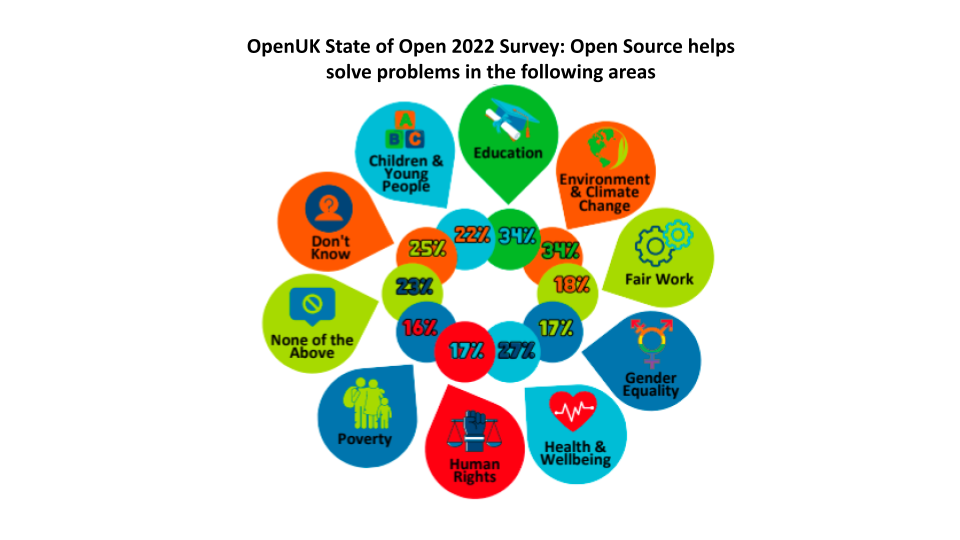
Societal Value Metrics for Open Technology
OpenUK launched its first sustainability strategy last year, and as a result embarked on a journey to elevate the role of Open Technology in society as an enabler across the 17 Sustainable Development Goals (SDGs).
Adopting open principles and Open Technology across government, business and academia is fundamental in order to facilitate the change required to achieve the prosperity of all people and of the planet. Open Technology is effectively collective equity, a public good which can be used by changemakers to support them in solving the societal problems they are being affected by, across the full sustainability spectrum – equality, education, climate, health, poverty, fair work, environment, justice and community.
When framing the role of Open Technology this way, the natural next step is to understand how that societal value can be measured. Most societal value measurement frameworks available in the UK (Cost-Benefit Analysis, Wellbeing Valuation, Social Return of Investment, TOMS Framework) place a monetary value on societal value. We believe it’s time we shift the measure of success away from perpetual economic growth, to a variety of societally focused metrics capable of representing the health and wellbeing of all people and the planet.
We’re not alone – many existing movements across sustainability, including the Youth Climate movement, have been shifting their attention to community level solutions. This communities over economics movement already has some major early adopters. New Zealand announced that it is ditching GDP for a new happiness and wellbeing metric under prime minister Jacinda Arden, Amsterdam has followed suit with its adoption of its own doughnut economic model, and Shanghai and several other cities in China have been working on similar metrics for some time.
We kicked off the Societal Value Metrics for Open Technology project in March 2022, in collaboration and with the support of the newly created OpenUK Sustainability Advisory Board, composed of people working on a broad spectrum of sustainability issues across government, business, academia, technology and NGOs. The scope of the project is as simple as it is challenging: how do we measure the contribution of Open Technology to society, in non-economic terms?
The first (and current) phase of the project is an extensive literature review in order to understand the landscape of measuring the societal value of something (technology, public services, infrastructure, buildings, etc), and how each of these initiatives defined their value themes, how those value themes align with the SDGs, what is being measured against them, and what examples of non-monetary measurement units have been used. Three cases from this literature review can be used to summarise the societal value measurement landscape:
For the technology sector, the Digital Public Goods Alliance has created a registry of open technology solutions that directly benefit at least one SDG and can therefore be considered a “digital public good”. This includes full solutions using open source software, open data, open AI models, open standards or open content. It does not include components, code in the stack, or open hardware solutions. The qualifying criteria for belonging on the registry takes into account the solution’s relevance to the SDGs, the use of approved open licenses, clear ownership, platform independence, documentation, data privacy mechanism, and a do not harm by design approach. It does not attempt to measure the value of the solutions in the registry.
Scotland National Performance Framework
The Scottish Government published this framework to give a measure of national wellbeing across social, environmental and economic indicators in order to inform public services reform, procurement, and equality policy development. The value themes being measured, or outcomes, include Children & Young People, Communities, Culture, Economy, Education, Environment, Fair Work & Business, Health, Human Rights, International, and Poverty. Each of these outcomes, which are essentially a localisation of the SDGs, are broken down into several indicators (81 in total) which determine the performance across each outcome as follows: Improving, Maintaining, Worsening, TBC, In Development.
UKGBC Delivering Social Value Measurement
For the built environment, the UK Green Buildings Council (UKGBC) has published their framework to measure the social value (environmental, economic and social) of building and places. It focusses on the development lifecycle of buildings and places, which includes Investment, Planning, Design, Construction and Operation and their contribution to the following value themes: Jobs & Economic Growth; Health, Wellbeing & Environment; Strength of Community (with specific indicators for each theme). The measurement output is always a monetary value.
During the next phases of the Societal Value Metrics for Open Technology project, the working group will be considering the following questions:
- What Open Technology (hardware, software, data) is being measured? This includes understanding where it resides, and how code in the stack, components and partial solutions are considered.
- How should the value themes be defined for Open Technology and how do these align with the SDGs?
- What is the non-economic measurement output for each value theme?
The Societal Value Metrics for Open Technology project will be showcased at the second annual OpenUK Open Technology for Sustainability Day in November, 2022.





